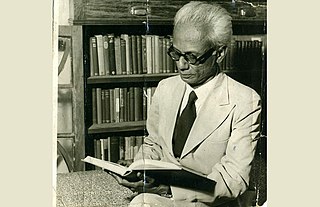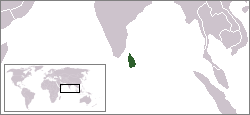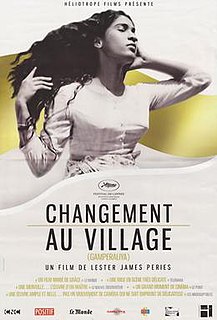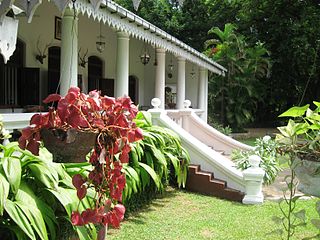
Lama Hewage Don Martin Wickramasinghe commonly Martin Wickramasinghe, MBE was a Sri Lankan author. His books have been translated into several languages. Wickramasinghe is often acclaimed as the father of modern Sinhala literature.
Gunadasa Amarasekera is a prominent Sinhala writer, poet, and essayist from Sri Lanka.

The 1958 anti-Tamil pogrom and riots in Ceylon, also known as the 58 riots, refer to the first island-wide ethnic riots and pogrom to target the minority Tamils in the Dominion of Ceylon after it became an independent dominion from Britain in 1948. The riots lasted from 22 May until 29 May 1958 although sporadic disturbances happened even after the declaration of emergency on 27 May 1958. The estimates of the murders range, based on recovered body count, from 158 to 1,500. Although most of the victims were Tamils, Sinhalese and their property were also affected by retaliatory attacks by Tamil mobs throughout the Batticaloa and Jaffna districts. As the first full-scale race riot in the country in over forty years, the events of 1958 shattered the trust the communities had in one another and led to further polarisation.

Richard Manik de Zoysa was a well-known Sri Lankan journalist, author, human rights activist and actor, who was abducted and murdered on 18 February 1990. His murder caused widespread outrage inside the country, and is widely believed to have been carried out by a death squad linked to elements within the government.

Rathnayake Arachchilage Victor, popularly known as Victor Rathnayake, is a Sri Lankan singer, composer, lyricist and a renowned musician. He was the first Sri Lankan artist to hold a solo concert; His concert known as "SA" was first performed in 1973, and was an instant success. Rathnayake credits his success to his "fitting blend of Western music with Ragadari classical music." His songs deal with diverse themes that vary from love, to patriotism and Buddhism.

Gamperaliya is a 1963 Sri Lankan drama film directed by Dr. Lester James Peries screenplay, dialogue and the script by Reggie Siriwardena and Tissa Abeysekara; it was adapted from the novel Gamperaliya by Martin Wickramasinghe. The film starts ensemble cast of several eras together including, Henry Jayasena, Punya Heendeniya, Wickrama Bogoda, Trilicia Gunawardena and Gamini Fonseka.

Kala Keerthi Dr Bastian Koralage Henry Rudrigo Jayasena, popularly known as Henry Jayasena, was an actor in Sri Lankan cinema, theater and television. With a career spanning more than four decades, Jayasena is considered one of the best dramatists in Sri Lankan drama.

Walauwa or walawwa is the name given to a feudal/colonial manor house in Sri Lanka of a native headmen. It also refers to the feudal social systems that existed during the colonial era.
Vedda is an endangered language which is used by the indigenous Vedda people of Sri Lanka. Additionally, communities such as Coast Veddas and Anuradhapura Veddas who do not strictly identify as Veddas also use words from the Vedda language in part for communication during hunting and/or for religious chants, throughout the island.
Kurulu Bedda is a 1961 Sri Lankan drama directed by L. S. Ramachandran and written by P. K. D. Seneviratne. It attempted to follow in the precedent set by Rekava and create a truly Sinhala film.
Ramaya Muttusamy was a prolific Sri Lankan music director and singer. He handled the music for most of K. Gunaratnam's productions.

The British Ceylon period is the history of Sri Lanka between 1815 and 1948. It follows the fall of the Kandyan Kingdom into the hands of the British Empire. It ended over 2300 years of Sinhalese monarchy rule on the island. The British rule on the island lasted until 1948 when the country regained independence.
Wilmot Arthur de Silva was Ceylonese veterinary surgeon, politician and philanthropist. He was the Minister of Health (1936–1942) in the second State Council of Ceylon and a former President of the Ceylon National Congress.
Warnakulasuriya Uswaththa Liyanage Sabeetha Janaki Perera is an actress in Sri Lankan cinema and old Lollywood cinema of Pakistan. She is the most succsessful female superstar during the '80s and '90s in Sinhala cinema. Sabeetha has received a number of awards for her acting, including the Sarasaviya, OCIC, Presidential and the Swarna Shanka.
Somsiri Sanath Julien Gunatilake, popularly as Sanath Gunatilake, is an actor, director, screenwriter in Sri Lankan cinema and film director. A highly versatile actor across many genres, Gunatilake is a veteran actor in the Sri Lankan cinema industry with a career spanning more than four decades. He Served as a member of Western Provincial Council as United National Party member, and later join as media head of President Chandrika Kumaratunga.

Polthutuwe Arachchige Jinadasa Niyathapala was a veteran Sri Lankan politician and a former member and Senator of the Parliament of Sri Lanka and former General Secretary of the United National Party. A section of the Nawala Road was renamed as the Jinadasa Niyathapala Mawatha in recognition of services rendered by Niyathapala to Sri Jayawardenepura Kotte.

Kala Suri Somalatha Subasinghe was a Sri Lankan actress, playwright, theatre director and educator from Sri Lanka. She received both the Kala Suri and the Kala Keerthi in recognition of her contribution to Sri Lankan theatre.

Sinhawalokanaya is a 2011 Sinhala sports drama film written and directed by Suneth Malinga Lokuhewa. The film features Dilan Jay and Raini Charuka Goonatillake in the leading roles while Menaka Rajapakse, Sanath Gunathilake, Kumara Thirimadura, Mihira Sirithilaka, Kanchana Mendis, Pubudu Chathuranga and Cletus Mendis also play key supporting roles. The Sri Lanka cricket star, Tillakaratne Dilshan also played a supporting role.
Pitiyage Mervyn Piyadasa Jayatunga [Sinhala]), popularly as Mervyn Jayathunga, was an award-winning actor in Sri Lankan cinema and stage drama. One of highly versatile actors highly popularized with villain roles, Jayathunga acted several critically acclaimed films such as Raktha and Pasamithuro.
Morathennage Douglas Ranasinghe, is an actor in Sri Lankan cinema, theater, and television. He acted in many supportive roles in movies including Akkara Paha, Yuganthaya, Viragaya, Sri Siddhartha Gautama and Dharmayuddhaya.











